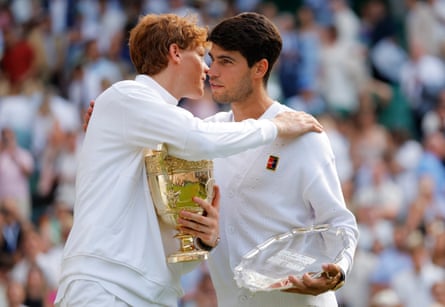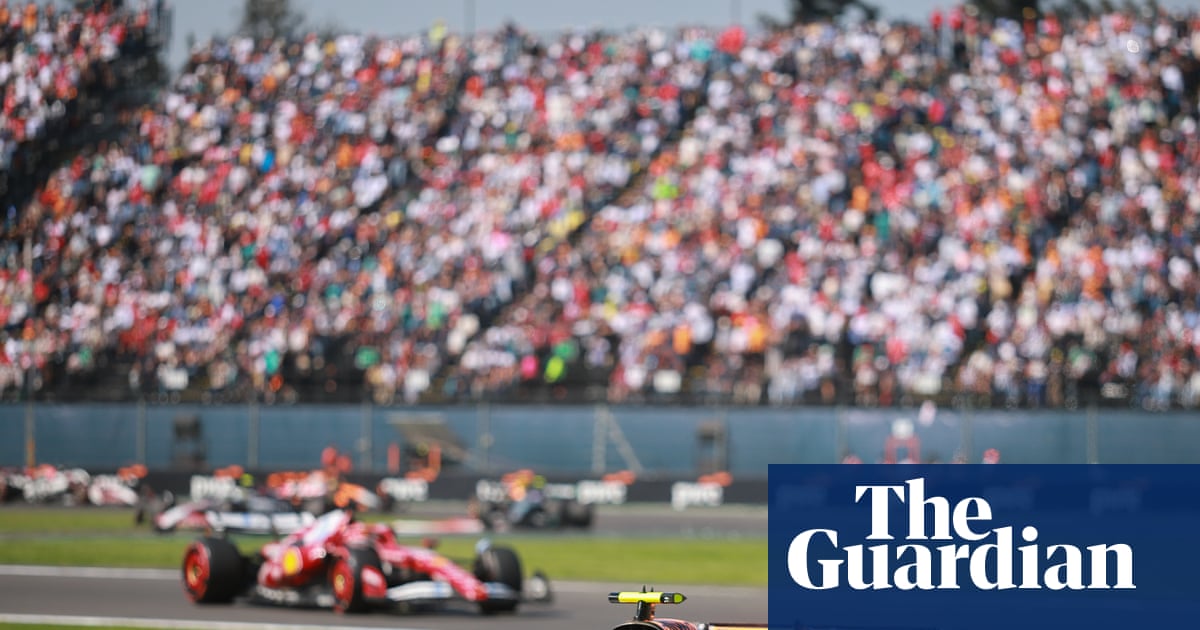As a boy, Jannik Sinner was a champion skier. As he stood on Centre Court match point up against Carlos Alcaraz, perhaps some of the old skills kicked in. Skiing teaches balance, it teaches flexibility and endurance, but most of all it teaches faith. There is a moment in every slide, before friction kicks in, when the body is basically at the mercy of powder and physics. And the greatest skiers learn that this is the moment to hold your nerve. When it feels like you’re falling, keep falling. When it feels like the edge of disaster, keep going.
Three match points against Alcaraz; take two. You’ve lost your last five matches against this guy. He’s the double defending champion. The last time you played, a few short weeks ago, he came back from two sets and three match points down to win. It was one of the most dramatic comebacks ever seen in a grand slam final, and here we are again. Alcaraz saves the first match point. He saves the second. The noise level is rising to a climax. When it feels like you’re falling, keep falling.
Sinner’s coach, Darren Cahill, tells a lovely story about that defeat at Roland Garros. Afterwards, as he’s leaving the players’ lounge to get in his car, Sinner stops at a big glass jar of gummy sweets placed by the exit. Most players walk straight past it out of deference to their nutritionist. Some take one or two as a treat or souvenir. Sinner takes the whole jar. Carries it out under his arm. Hands them out gleefully to his team afterwards. That was the moment Cahill knew he was going to be OK.
And so perhaps we all took the wrong lesson from that epic tussle last month. The very fact that Alcaraz had required a comeback that colossal simply to claim a narrow victory, via a fifth set tie-break, should have been a sign that the hard tangibles still favoured Sinner, if he could just keep his nerve, keep giving himself a chance, keep falling. Most neutral observers backed Alcaraz ahead of this final, albeit with two caveats. One, it was going to be close. Two, Alcaraz would need to pull out every last miracle in his pocket.
Because even Sinner’s bogstandard, pasta-and-cheese tennis is of such a relentlessly high level that it basically requires a godlike genius like Alcaraz to unravel it. The only players to beat him in the last year are Alcaraz, Alexander Bublik, Andrey Rublev, Daniil Medvedev, and what they all have in common is a certain unpredictability, verging on the mercurial. Take Sinner out of his comfort zone, and you have a puncher’s chance. Because what constitutes Sinner’s comfort zone is perhaps the most uncomfortable place it is possible to exist in professional tennis.

There’s not much mystery there. Sinner is going to hit it clean, and he’s going to hit it quick, and he’s going to hit it hard, and he’s going to do it all afternoon. Sinner takes you into a tunnel of pain, to the point where you start to despair of ever seeing the end, perhaps that there even is an end. Alcaraz’s serve collapsed in sets three and four because of the sheer pressure Sinner was putting on it, forcing him to go for a little more every time. The endless drop shots were a desperate attempt to end the points quickly, because staying in them was simply too agonising.
And of course Alcaraz has a higher pain threshold than most. He even took the first set in characteristically theatrical style, thrusting a backhand winner into the open court while tumbling to the ground like a cheetah slipping over in the ketchup aisle. This is the best of Alcaraz: tennis on the very edge of the world, tennis that moves people, tennis as dialogue. Part of the reason I think he likes grass so much is that it gives him something back. He treads and it responds, and in a slightly different way every time.
Was what followed the worst of Alcaraz? Perhaps instead we should give Sinner his due. From high in the stands, the prevailing motif of the last couple of sets was the constant puffs of chalk dust on Alcaraz’s side of the net, as Sinner’s strokes kept pinging the lines like sniper’s bullets. Tennis as warfare, tennis as intimidation, tennis as the end of an argument.
after newsletter promotion
And before long, we were at the end. No miracles, no rocks or bumps, just a smooth slide to the bottom of the mountain. The crowd were hot and drunk and satisfied. Someone popped a champagne cork just as Sinner was about to serve. Someone shouted “come on, Tim” during the fourth set, and frankly what’s Yvette Cooper going to do about this particular menace to our nation? Finally Sinner served, and for the last time the ball did not come back.
Another twist, then, in this brilliant little rivalry. And this was a good result for the rivalry, good for the lore, good for the narrative as the tour swings towards the hard courts of North America and Alcaraz’s bid for New York redemption. Perhaps even good for Alcaraz too in the long run, a champion who could learn a little of Sinner’s ruthlessness on the off-beats, who often struggles to find his voice when the dialogue falls silent.
As for Sinner, once the celebrations had died away, he did a strange thing. He patted the grass with the palm of his hand, again and again, almost as if thanking it, as if it were a faithful horse. The four-time grand slam champion climbed the steps to his box, clasped his family in his arms and cried like a little boy again, a little boy who had reached for the sweets and come away with the whole damn jar.

 3 months ago
63
3 months ago
63

















































